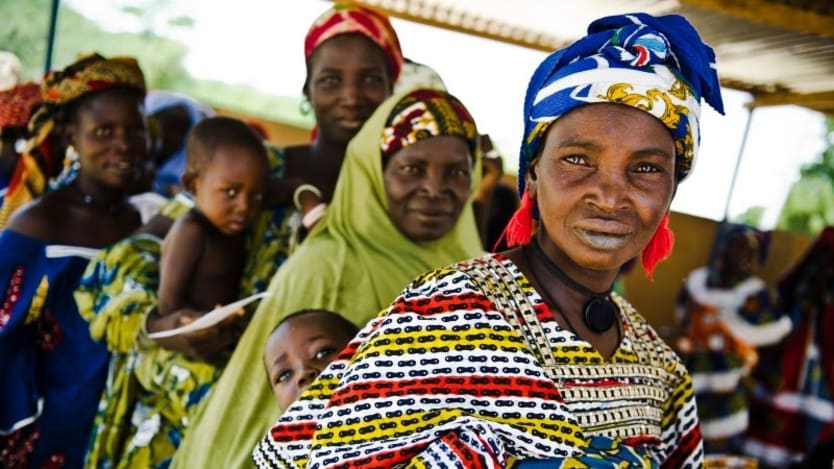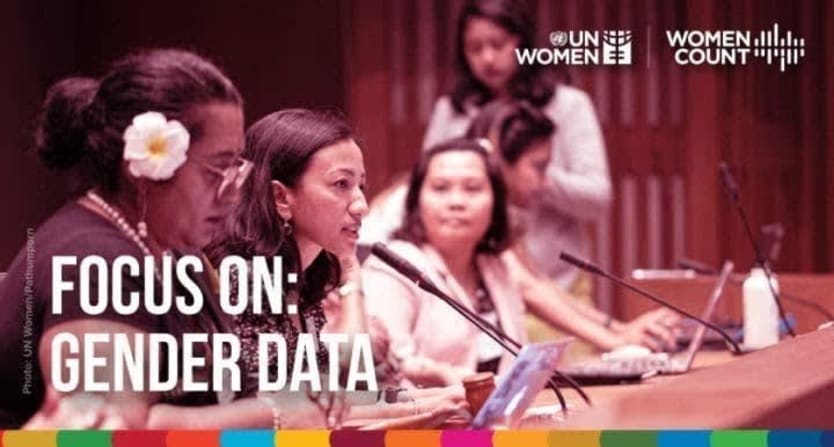
OUAGADOUGOU, Burkina Faso — In war-weakened Burkina Faso, several aid groups are still in the early stages of gender data collection.
Attacks linked to Islamic militants, local defense forces, and the army have ravaged the once-peaceful country, making it hard for organizations to reach vulnerable populations — including some 850,000 internally displaced people — and to collect information. The nascent emergency response also means that humanitarians, new to the country, have yet to build trust within communities, which would allow people to feel more comfortable sharing insight into their lives.
Gender analysts say having data disaggregated by age, sex, and disability is vital to understand the challenges populations face, particularly in areas of conflict.
“Without consistent disaggregated data and analysis, targeted support to those that need it most is impossible,” said Nidhi Kapur, a gender specialist focused on Africa.
Burkina Faso fares only slightly better than some of its West African counterparts in its gender equality ranking, according to this year’s “Global Gender Gap Report 2020," scoring 129 out of 153 countries. Neighboring Mali ranks 139, and Togo 140, comparatively.
This article is part of Focus on: Gender Data
This focus area, powered by UN Women, highlights how data is being used to inform policy and advocacy to advance gender equality. Gender data is crucial to make every woman and girl count.
Women held only 14 of 127 seats in the national assembly, according to last year’s human rights report by the U.S. State Department. When it comes to unpaid care work, 90% of people in Burkina Faso see it as a women’s responsibility and 70% do not think that this work should be shared. And more than 1 million women and girls in the country are facing increased sexual violence, hunger, and water shortage as a result of the coronavirus and violence.
Already hampered by access constraints and now further derailed by COVID-19, data and gender experts tell Devex that nuanced information is more critical than ever in order to protect against worsening gender inequalities.
“The current system risks making the situation worse.”
— Donald Brooks, CEO, Initiative: EauCollecting data amid insecurity and COVID-19
Some organizations are using COVID-19 as a wake-up call to emphasize the importance of collecting and using data to better understand what women endure.
“Gender experts have known for a long time that there is a gender data gap … What COVID-19 has shown is that this data gap around women can play out quickly and dramatically on a global stage. It has put the spotlight on the fact that ignoring women isn’t just unfair, it comes at a cost for everyone,” said Emily Janoch, global director for learning at CARE International.
The aid group has been operating in Burkina Faso since 2017 but has yet to collect primary gender data. Using secondary data, however, such as United Nations reports and the country’s national census, CARE adjusted some of its initiatives specifically related to the coronavirus.
For example, data showed that women in Burkina Faso and across West Africa were having a hard time accessing information, Janoch said. Women rely heavily on information networks, such as speaking with friends at the market, as a source of knowledge — channels that got blocked off during lockdown.
“It became clear very early on that women were not getting the information that they needed to make good decisions by themselves,” Janoch said.
CARE worked with health centers in Burkina Faso to train about 50 health workers on COVID-19 prevention and risks so they could transmit information to women in rural communities. With this effort, along with campaigns about the virus via radio, TV, and billboards, and by working through community leaders who went door-to-door, the organization reached around 1.3 million people, she said.
But since CARE hasn’t spent that much time in the country, its access to this primary data is minimal. Deep relationships with communities “allow us to access information in ways that other people don’t. We have less of that in Burkina because we haven’t been operating there as long,” Janoch said.
Similarly, the International Rescue Committee, which began working in the country in March last year, has been struggling to collect data to inform its programming, said Vanessa Coeffe, child protection coordinator for the organization.
IRC has been relying on secondary data from other organizations or the government, but it has been hard to secure recent information, especially in the regions they work, Coeffe said. The group operates in the Sahel and north regions, which have been hardest hit by violence.
“It has been very difficult to collect information related to gender-based violence and women and girls. Insecurity makes it nearly impossible to get data in some remote areas,” she said.
Q&A: What early data says about gendered impacts of COVID-19
UN Women rolled out surveys in multiple countries in Asia and the Pacific just weeks after the pandemic was declared. Statistics specialist Sara Duerto Valero explains how the agency was able to act so quickly, and what the data reveals so far about the impacts of the crisis on men and women.
One of the challenges is finding educated and available women to work as data collectors, which can help women feel more at ease than being asked questions by men. It’s also taking time to make inroads with communities and gain trust, she said.
IRC plans to gather more sex-disaggregated data through its upcoming programs, which will focus on preventing and responding to violence against women and girls through psychosocial support and community awareness, Coeffe said.
Adjusting programs based on gender analysis
Other organizations that have been in the country longer have had some success in using gender data to inform decisions already.
Last year, UNICEF, which has been working in Burkina Faso for almost 60 years, conducted a study focused on the prevalence of physical, emotional, psychological, and sexual violence against boys and girls in schools and communities. The last time a similar study was done was in 2006, and the 2019 results showed that things had changed, said Ida Tamini, gender specialist at UNICEF in Burkina Faso.
The 2019 study found that violence against children was more prevalent in communities than at school, whereas 13 years earlier it was the other way around, she said.
UNICEF is looking into why things shifted, but in the meantime, it has adjusted its programs to address the findings. Since January, UNICEF has invested $1.7 million into programming focused on violence in communities, bringing onboard seven local civil society groups in the East, Sahel, Boucle Du Mouhoun, Center North, and North regions to work on projects that combat gender-based violence, child marriage, and female genital mutilation, among other areas.
Mercy Corps, which has had a presence in the country since 2014, gathered gender data from its recent ENHANCE program, a project focused on helping communities better feed and care for different breeds of goats in Burkina Faso and Niger.
The gender analysis revealed that men had more say at home in terms of how and where money was spent and in overall decision making than women. Consequently, Mercy Corps adapted the project to work closely with men to help them improve interactions with their wives about decision-making at home.
But even when organizations have access to data, emergency contexts pose a challenge, especially when aid workers are stretched and the population is overwhelmed.
“It’s so difficult when time is critical, when there’s violence, displacement, food insecurity, and other negative impacts, populations are extremely stressed and aid workers are trying to respond quickly to get resources on the ground. Data collection can be rushed and we don’t always get it right, with the potential for missing information and gender analysis,” said Maggie Janes-Lucas, director for one of Mercy Corps’ collaboration and learning projects in Niger and Burkina Faso.
Not only is data collection important, but organizations need to analyze, learn from, and adapt programming based on collected information and then take time to reflect on it, she said. If countries and leaders have the right data and use it, it can make a huge difference in how an intervention succeeds and if it’s targeting the right participants for impact, she said.
The government’s tight grip
Compounding the challenges posed by Burkina Faso’s volatile context and the coronavirus, is the fact that the government maintains control over information.
Several aid groups told Devex that since the onset of the country’s humanitarian crisis, the government has kept a firm hold on what data can be used and whether organizations are allowed to gather and use their own statistics.
One aid worker, who wished to remain anonymous, said that unlike other countries where organizations and the government share access to an information management system that records cases of individuals who have experienced sexual and gender-based violence, Burkina Faso’s government is resistant to sharing such information.
Data collection conducted by the government, especially regarding internally displaced people, is slow, and access to collected data is restricted, said Donald Brooks, chief executive officer for Initiative: Eau, a U.S. aid group focused on increasing the safety and security of drinking water services in developing areas and crisis zones.
In a meeting in early May, the humanitarian arm of the government told all aid groups in the country’s east to use only government data and warned organizations against relying on their own, he said. But humanitarians trying to provide support for thousands of displaced people in the east, where violence has surged, have been waiting on government data for months. The delay has prevented the arrival and distribution of adequate aid, Brooks said.
“Faster and more transparent access to data means the whole humanitarian system, including the government, can more quickly deliver critical aid to prevent needless suffering while ensuring that the most vulnerable aren’t being left out,” he said. “The current system risks making the situation worse.”
Devex, with support from our partner UN Women, is exploring how data is being used to inform policy and advocacy to advance gender equality. Gender data is crucial to make every woman and girl count. Visit the Focus on: Gender Data page for more. Disclaimer: The views in this article do not necessarily represent the views of UN Women.

Search for articles
Most Read
- 1
- 2
- 3
- 4
- 5








